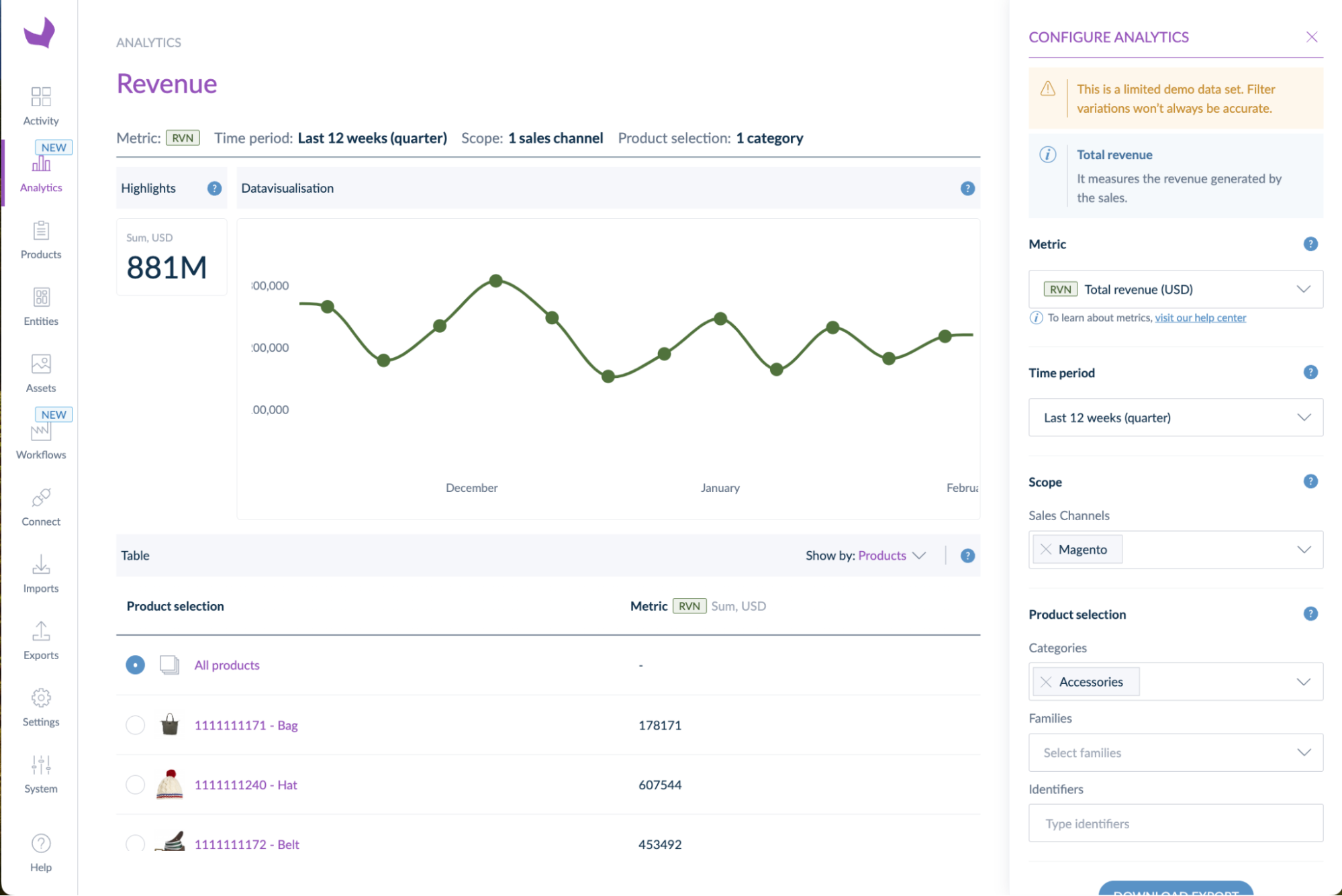99.9% uptime and seamless migration in just 5 months
Akeneo migrated from self-managed Elasticsearch to Elastic Cloud with zero customer impact. The five-month transition eliminated infrastructure stress and delivered enterprise-grade reliability.
3x faster performance with 30% fewer servers
Elastic's managed environment delivered three times the performance of Akeneo’s in-house setup. Infrastructure was streamlined, cutting server usage by 30% and lowering carbon emissions.
Teams focus on product, not infrastructure
Switching to Elastic Cloud let Akeneo dissolve its DevOps team and bring those engineers into product development. They now release updates every 30 minutes instead of once a week, and the shift cut operating costs by 50%. More time goes into building features, not managing infrastructure.

Akeneo scales product information management with enterprise-grade search
Akeneo is a global leader in product information management, helping brands and retailers structure and deliver accurate product data across all channels. Its platform centralizes everything from legal specifications to marketing assets and supports industries as diverse as cosmetics, fashion, and industrial manufacturing. Each customer has unique data models, often complex and constantly evolving.
As Akeneo expanded to serve larger enterprise clients, the technical stakes rose sharply. Healthcare customers required access to 36 years of product history to meet compliance requirements. Other clients managed massive, fast-changing catalogs. Traditional databases could not keep up with this level of scale and flexibility.
For nearly a decade, Akeneo ran Elasticsearch on its own, using the open source version within its Google Cloud infrastructure. "Every time someone reads product information, whether through the API or the interface, it goes through Elasticsearch," says Benoit Jacquemont, cofounder and CTO. "It plays a central role in our architecture, and uptime is critical."
While the technology held up, self-managing the infrastructure created unnecessary pressure over time. Keeping performance consistent at scale required constant attention, which was becoming a significant overhead. Deployments were stressful, and engineers spent more time maintaining clusters than building product features — something the business could not tolerate. As Akeneo grew, the team needed a more stable and hands-off solution.
Refocusing on core business with Elastic Cloud
In 2023, the team made a strategic decision to move from self-managed Elasticsearch to Elastic Cloud, the official managed service from Elastic. "Our goal is not to manage infrastructure," explains Jacquemont. "It is to bring value to our customers. Everything we can delegate to experts, we will."

Founded in 2013 and headquartered in Nantes, France, Akeneo is a technology company that develops product information management (PIM) and product data intelligence software to improve customer experience.
Akeneo considered alternatives, including OpenSearch on Amazon. But with its entire platform running on Google Cloud Platform, routing data between providers would add unnecessary latency and cost. Elastic Cloud offered a simpler path, with Akeneo able to tailor deployments to specific needs while maintaining operational responsibility, closer to its infrastructure and backed by direct support.
The migration took five months and caused no disruption to customers. Because the versioning and functionalities matched closely, Akeneo did not need to rewrite any code. "We were moving the same data into a managed environment. It was not like changing tools," Jacquemont explains.
Improved uptime, better performance, and lower costs
The benefits showed up quickly. Uptime climbed to 99.9%. Performance tripled, and infrastructure was reduced by 30%. Jacquemont immediately recognized a decrease in stress levels, too. "We moved from one deployment per week to one every 30 minutes. What used to be very stressful is now a non-event," he says.
With fewer servers to run, Akeneo also lowered energy consumption and shrank its carbon footprint. "We didn't expect such a gap between what we had before and what the platform delivers. It changes everything," says Jacquemont.
The migration also eased the monitoring burden on engineers and reduced support tickets. With fewer incidents and a more stable backend, developers could focus on building new features instead of reacting to issues. That shift paved the way for a bigger organizational change. Akeneo dissolved its dedicated DevOps group, and those engineers joined product squads. "Everyone is now a software engineer here," says Jacquemont. "And they are much happier contributing to product, not pipelines."
"We moved from one deployment per week to one every 30 minutes. What used to be very stressful is now a non-event."
This restructure transformed how teams shipped code. Making deployment part of everyday work improved both speed and quality across the board. On the financial side, the move to Elastic Cloud on Google Cloud Platform helped reduce infrastructure costs and allowed for smarter team allocation. Akeneo cut total spending for this layer by 50%.

Akeneo's move to Elastic Cloud on Google Cloud Platform helped reduce infrastructure costs and allowed for smarter team allocation.
A collaborative partnership that adapts to Akeneo's needs
Elastic's professional services team was involved from the start, guiding Akeneo through a smooth, five-month migration. "We had many discussions on how to minimize service interruption," says Jacquemont. "The team helped us map out the best approach and reduce downtime to almost nothing."
Beyond logistics, Elastic's consultants offered concrete recommendations on data modeling and performance tuning. "They arrived with best practices from other clients but adjusted quickly when those didn't fit our architecture," Jacquemont explains. "It wasn't copy-paste. It was truly adapted to our needs."
Working with Elastic consultants, Jacquemont and his team were also impressed with the performance of Elastic. Initial results were compelling. "What surprised us the most was the performance gain. We did not expect such a significant difference between what we had and what Elastic delivered," he says.
The Support team also stood out for their collaborative spirit. "We had one main point of contact throughout, which helped a lot," he says. "And when we needed more technical depth, the Elastic Support team connected us with the right experts."
"Elastic and Google Cloud Platform helped us reduce our infrastructure by about 30%. That translates directly to a smaller carbon footprint and real cost savings."
Today, Elastic Cloud powers Akeneo's platform quietly in the background. It no longer requires constant attention. The migration cleared space for engineers to focus on product development instead of infrastructure and gave the company a technical foundation it can trust. Elastic's contribution allows Akeneo to concentrate on its value proposition to users. Jacquemont concludes: “Elastic Cloud on Google Cloud Platform gives us the performance, stability, and peace of mind we never had with self-managed infrastructure. It lets us focus entirely on delivering value to our users."
Jacquemont also says that by adopting cloud with Elastic and Google, Akeneo has saved money, too. "Elastic and Google Cloud Platform helped us reduce our infrastructure by about 30%. That translates directly to a smaller carbon footprint and real cost savings," he says.